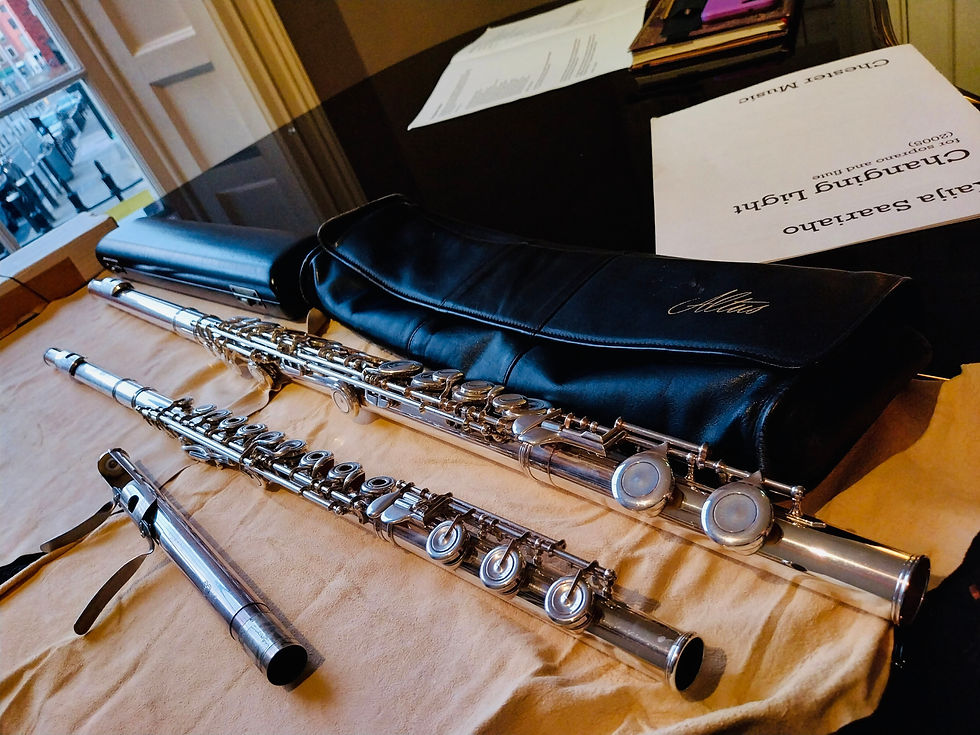
F i o n n . H a n
W r i t e r ╳ C o m p o s e r ╳ D e s i g n e r


Feeding Rainbows
Contemporary score for Finding A Voice Music Festival in Ireland.
▪ Original score for 1 flute and 1 soprano
▪ Alternative version: harp (with electronics) and grand vocal cycle
Thrilled to share that I've been chosen as one of six emerging female composers for the Finding A Voice Music Festival in Ireland! It was a true privilege to learn directly from celebrated Irish musicians William Dowdal (flute) and Sylvia O'Brien (soprano) in an exclusive workshop setting. Experiencing firsthand the brilliance of their techniques, the impact of real instruments, acoustic effects, and powerful singing voices exceeded my expectations. Grateful for the opportunity!
Special thanks to Artistic Director Róisín Maher for her dedication in organizing not only the in-person workshop but also the one-on-one mentorship sessions with acclaimed composer Siobhán Cleary. It's rare for me to have the opportunity to delve into scoring details with others, and these in-depth discussions, from bar to bar, have truly helped me uncover blind spots and gain fresh insights into composition.
And to top it off, everyone involved has been incredibly kind, resourceful, and generous with sharing their insider tips. Plus, connecting with other Irish female composers has been a highlight for me. Thank you all for sharing your diverse practices within Ireland—What a refreshing experience to talk in ‘composer language’:)
The mock-up recording you'll listen to below is an excerpt of the alternative version featuring electroacoustic harps and multiple sopranos in chorus. Following that, you'll find the composer's notes, my inspirations and memorable moments from the past two months.
Composer's Note
Gnawing at stone, feeding rainbows.
Drawing inspiration from the Pantone Colour of the Year, I aim to craft a composition that resonates with the current global landscape, emphasizing the theme of compassion. In tune with Peach Fuzz, a hue symbolizing our innate yearning for connection, my piece seeks to embody warmth while bridging vitality and timelessness. Recognizing that misunderstanding and lack of communication breed hatred, I endeavor to orchestrate dialogues between the flute and soprano, showcasing their extraordinary skills through contemporary techniques and highlighting the beauty of mutual listening.
Furthermore, my composition finds inspiration in Wisława Szymborska's evocative poem "Water,"a reflection on the inclusive, variable, and sometimes cruel nature of water, from a single raindrop to the vast Pacific Ocean. As Szymborska poetically states, water is perpetually "gnawing at stone, feeding rainbows."








To symbolize the universality of water and humanity, I employ vowels—the elemental components of human language—to create expressive lyrics. Emotions and the performers' real-time interpretations are pivotal, echoing the ethos of inclusivity depicted in the poem. In addition to rivers mentioned in the poem like the Ganga, Nile, and Vistula, I incorporate others like the Amazon, Yangtze, Mississippi, and Euphrates to illustrate the diverse voices of water across the globe.
By portraying the dynamic interplay between various voices, my composition aspires to foster compassion, peace, and introspection on the nuances of understanding and misunderstanding within our world.
*The photo accompanied by the poem was shot at Leenaun Hill in Connemara National Park, Ireland.
Water
by Wisława Szymborska
A drop of water fell on my hand,
drawn from the Ganges and the Nile,
from hoarfrost ascended to heaven from a seal’s whiskers,
from jugs broken in the cities of Ys and Tyre.
On my index finger
the Caspian Sea isn’t landlocked,
and the Pacific is the Rudawa’s meek tributary,
the same stream that floated in a little cloud over Paris
in the year seven hundred and sixty-four
on the seventh of May at 3:00 a.m.
There are not enough mouths to utter
all your names, O water.
I would have to name you in every tongue,
pronouncing all the vowels at once
while also keeping silent - for the sake of the lake
that still goes unnamed.
Someone was drowning, someone dying was
calling out for you. Long ago, yesterday.
You saved houses from fire, you have carried off
houses and trees, forests and towns alike.
You’ve been in christening fonts and courtesans’ baths
in coffins and kisses.
Gnawing at stone, feeding rainbows.
In the sweat and the dew of pyramids and lilacs.
How light the raindrop’s contents are.
How gently the world touches me.
Whenever, wherever, whatever has happened.


Festival Note
Female voice as instrument. Unplugged River Suir. Irish mythology
Iness Mezel Berber Duo: Heritage and Protest in the Amazigh Culture -- nice tunes: The poetry of water, Song without words, Call for the rain (Africa), Tilsit ( foundtain vs boiled water)
Evlana: Water and Magic -- suprisingly good acoustic at STAC Chapel and selected bearutiful tunes (the whole pragram was well-curated by Siobhán.)
▪ Rebecca Clarke, Seal Man (1922)
▪ Keiko Abe, Memories of the Seashore (1094) -- marimba + vibraphone go so well with strings/woodwind.
▪ Siobhán Cleary, Ondine (2013) -- modern interpretation from the female perspective
▪ Deborah Cheetham Fraillon, Permit Me (2020) -- brilliant cellist
▪ Judith Ring, The River Was Never Afraid (2024) -- multi--layers of water in Clonmel *World Première
▪ Joan Tower, Petroushskates (1980) - inspired by iceskating and Stravinsky
Amerghim: Wind on Sea -- Song of Amergin (Irish mythology): Am gáeth I m-muir ar dome (I am the wind on the sea). Highlights of the program:
▪ Keiko Abe, Memories of the Seashore (1094) -- her 12 Sonatas, Opus 16 (published in 1683) contains the earliest published sonatas by a woman.
▪ Elisabeth Jacquet de la Guerre (1665 -- 1729) -- French and Italian idioms
▪ Sona Jobarteh (b.1983) -- The meeting point between West African instruments and Western Classical sounds ; how to transform a harp into a Kora ?
▪ Adele O’Dwyer, Forever Flowing (2024) -- *World Première









